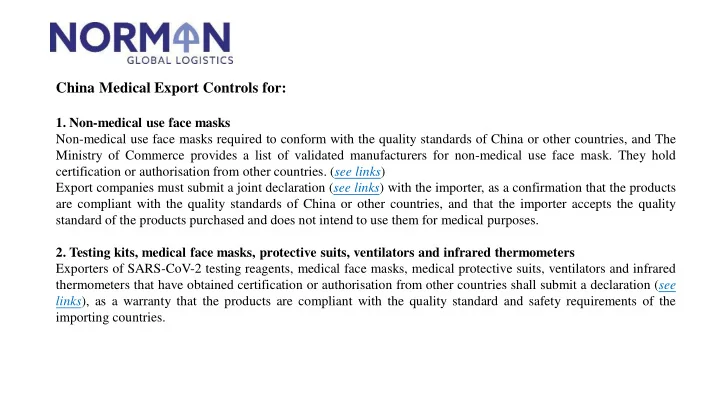

China Medical Export Controls for: 1. Non-medical use face masks Non-medical use face masks required to conform with the quality standards of China or other countries, and The Ministry of Commerce provides a list of validated manufacturers for non-medical use face mask. They hold certification or authorisation from other countries. ( see links ) Export companies must submit a joint declaration ( see links ) with the importer, as a confirmation that the products are compliant with the quality standards of China or other countries, and that the importer accepts the quality standard of the products purchased and does not intend to use them for medical purposes. 2. Testing kits, medical face masks, protective suits, ventilators and infrared thermometers Exporters of SARS-CoV-2 testing reagents, medical face masks, medical protective suits, ventilators and infrared thermometers that have obtained certification or authorisation from other countries shall submit a declaration ( see links ), as a warranty that the products are compliant with the quality standard and safety requirements of the importing countries.
Links: Approved suppliers: Non-Medical Use Face Masks Companies with Certification/Authorisation from other Countries Medical Devices and Supplies Companies with Certification/Authorisation from other Countries For updated information, visit our news center: Link Links to our site for downloadable docs, Joint Declaration & Export Declaration: Link List of disqualified manufacturers that can be found at: www.samr.gov.cn Do not work with blacklisted suppliers / unqualified exporters. Importing medical devices into the EU, quality management system and CE certificate: Class I device: Link Category III items: Link Importing surgical masks and respirators into the USA, need QMS and compliance with GMPs: Link
PPE and Medical Exports Key summary: • Shipper need to be on the approved list to export. • Shipper need to be able to provide full & valid documentation to export PPE out of China. • Both seller and buyer should give a Joint Declaration form. • The usage declaration is required for the non-medical products. • PPE classified for medical purpose during export customs clearance, and the manufacturer must be registered in the system. • Customs regulations can be changed with/without short notice. • Check rules in the importing region. 3
China Medical Exports – Logistics Tips Logistics Tips • Huge volumes of PPE equipment is departing from and congesting China airports. • In 2018 China produced 50% of global PPE equipment*. • Prepare all required shipping documents for import/export. • China customs may hold cargo if incomplete documents, risk delays, or even goods being confiscated. NOTE: Not all medical and protective masks on the market comply with EU standards and regulations. It’s therefore essential that the importer verify products and all relevant documents, lab reports, etc., before arranging the import from China or other areas. * Information according to Peterson Institute for International Economics
Logistics & Customs • Customs regulations can be changed without or with short notice. • Congestion and gridlock at airports, especially for Shanghai. • Congested terminals and roads, trucks can be in queues for 2-3 days to deliver cargo. • Cargo should be ready 1 week prior departure to arrange for delivery and clearance. • Increasing and volatile costs for clearance and shipping. • Majority of shipments require customs inspection. • Shipment between Hong Kong & China is difficult due to customs border crossing control. • Cargo from Mainland China recommended shipping directly from China airports, not via Hong Kong. • Export customs clearance from Hong Kong for medical supplies could be easier. Still the materials must be manufactured in Hong Kong or already present in Hong Kong at the time of the export declaration. • If cancel any shipments after booking confirmation, dead freight charges might occur. • Delayed flights / sudden changes in schedule are frequent events in this period. • Freight charges required before the departure by airlines & agents. The airline will require ‘dead - freight’ payment if a shipment failed to catch departure, for the full freight amount – no matter the reason or fault; could be held by customs checks, airline terminal failure, transport delay etc.
Recommend
More recommend